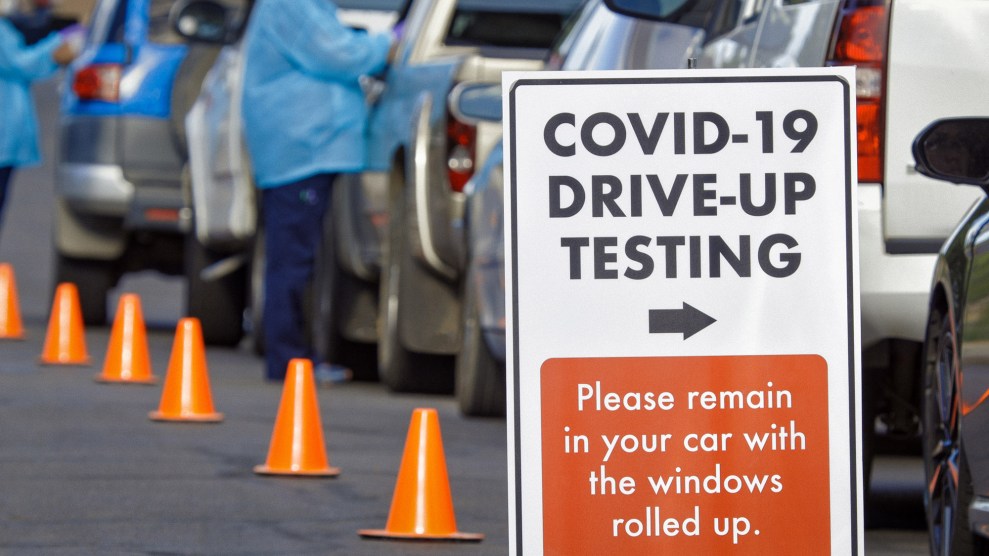Mary Sedor-Pauly, 61
Position: Circulation clerk
Started: Spring 2002
Quit: June 26, 2020
Salary: $26.12 per hour
As told to Madison Pauly
I worked as a circulation clerk at the front desk of a library, issuing library cards, checking items out for people. You see everybody who comes in the front door. It’s a very clean environment, bright, generally quiet—although, through the 18 years I worked there, it’s evolved more into a community center and less of a “shh, people are studying” kind of place.
It’s important to me to know the rules. I was always wanting to know what was expected of me, doing the best that I could, and wanting to act appropriately.
They shut down during the pandemic relatively quickly, around when everybody else did. As soon as it happened, and I was home, I started thinking, “What is it going to take for me to feel comfortable about going back?” Being over 60 years old and having high blood pressure, although I consider myself in relatively good health, I already had two risk factors. I was hoping that the library would just stay closed, for quite a while.
As it turns out, I believe we were the one of the first libraries in Suffolk County, New York, to decide to bring employees back—though at first we weren’t opening the library to outsiders, just employees.
When we reopened, we set up curbside. We had fewer employees, less supervision. We had sanitizer, gloves. Generally, people were keeping their distance. But there were some employees who were not wearing their masks properly. I was vocal about that, saying, “Hey, you don’t have your mask on.” I’m not shy. I never cared about not speaking up to protect myself.
Before going back, we had a departmental video chat with our supervisor and the two people in administration who run the library. I probably was the only one asking questions about air circulation. I had spent time preparing for this phone call. I had reviewed CDC guidelines. I guess I did feel a little bit like Erin Brockovich, fighting for some of our rights. I got the feeling that they pretty much tolerated my behavior rather than being thrilled about it.
In that meeting, the director of the library said a number of times, “We know a number of you are not going to be comfortable coming back and we expect that.” It seemed odd to hear that over and over—almost made me feel like she was looking for some people to not come back. There was not a lot of, “We’re going to make sure that you are safe.” She actually said specifically, “You signed up for this.” That made the hair on the back of my neck go up, because anybody who works with the public did not sign up for being exposed to pandemic germs. Was the potential always there? Yes. But when was the last pandemic? Nobody ever had that in their psyche, that that was possible.
Then they made the decision that they were going to allow the public indoors. We got a very short memo that said: “This is how it’s gonna be. We’re gonna put up signs that say people need to wear masks. If someone doesn’t come in with a mask, do not be confrontational. If people decide to invade each other’s space or get too close to each other, that’s something that they’ll work out among themselves. We’re not going to get involved.”
A lot of that made me very uncomfortable. I know from the public that I work with, some are rule followers and some are not. I was concerned about who was going to be dealing with the people who were not following the rules. I had a bunch of questions, but I had no supervisor who was physically there to ask. And then I saw that on the second day of opening to the public, I was the only one who was going to be in the department. I made a call to my supervisor—didn’t get an answer. I went into the director’s office and I said, “It looks like I was scheduled alone on Tuesday morning.”
She pretty much blew me off. She said, “You need to speak with your supervisor.” I said, “I don’t see her anymore.” She put her hand up into the air to the side, and she goes, “It’s only a soft opening.”
I felt completely disrespected. To be honest, once the director of the library dismissed my concerns and didn’t seem open to wanting to discuss any other issues, I shut down. That night I cleaned out my locker of 18 years.
I wasn’t looking to say “fuck you” to them, but I wasn’t going to let them dismiss my concerns. I was privileged enough to be able to leave. I know a lot of people are not able to do that. A lot of people have to show up at jobs, because if they don’t show up at those jobs, they’re not going to be able to pay their rent. And yet they’re living in states where the governors are not mandating masks. And we have a president who doesn’t have a plan. It makes me sad, because I know a lot of people died because they’ve had to work. I have no complaints about what I went through. I know that I was very lucky to have this choice to work or not.













